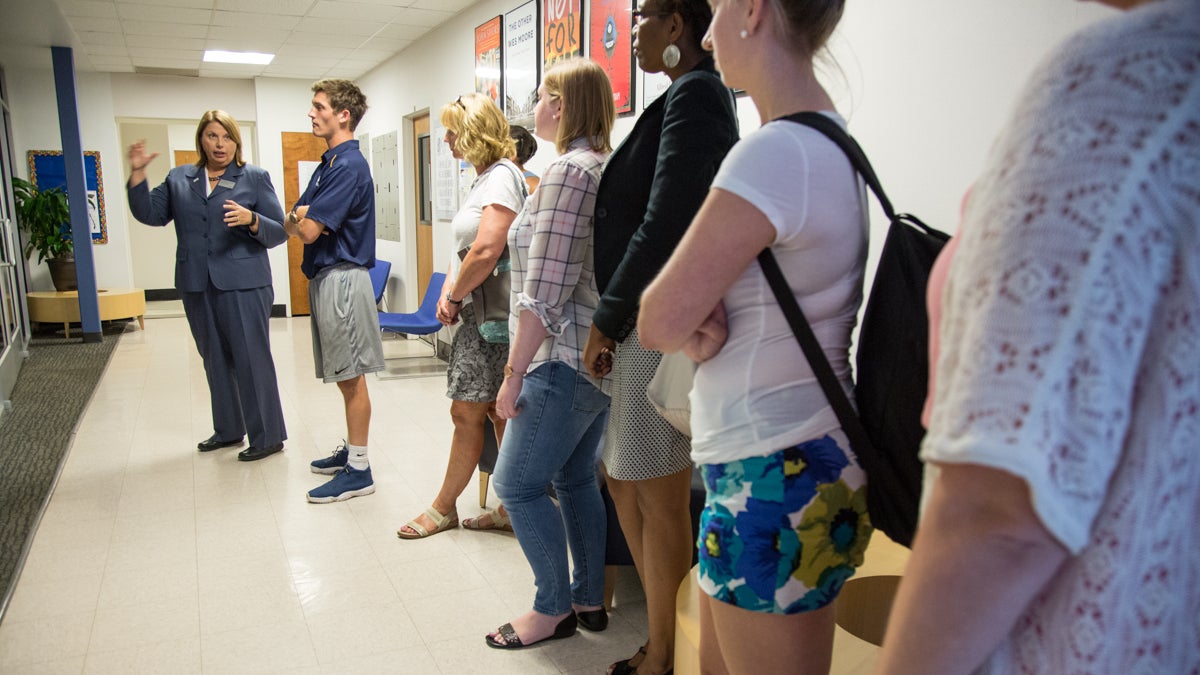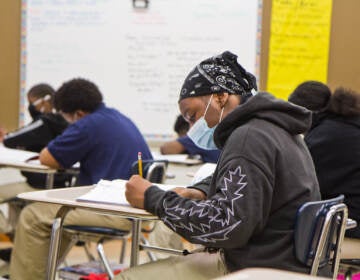‘Comebackers’ get help from Graduate! Philadelphia on quest to finish college degree
Listen
Dr. Marguerite Weber takes her new students on a tour of the college campus on their first day in her new degree completion program at Cabrini College in Radnor, Pa. The students range from 21 to 52 and come from all walks of life in pursuit of finishing their college degree. (Emily Cohen/for NewsWorks)
More than 1 million adults in Pennsylvania started college but never earned their degree. About 380,000 of them are living in the Greater Philadelphia area.
Graduate! Philadelphia is a program that helps “comebackers” — adults who have some college credit — return to finish their education.
LaCountess Ingram has come back to college after almost 25 years. She recently stopped by the Graduate! Philadelphia offices in Center City, on her lunch hour, to see her adviser Denise Whittaker.
“I’m going into algebra, and that’s kind of a little nerve-racking, and I want to stay on top of my writing skills too,” she told Whittaker. “l just wanted to know is there anything you could direct me toward?”
The nonprofit Graduate! Philadelphia provides free advice to adults with some college credit who want to return to their studies — people exactly like Ingram.
When she graduated from suburban Abington High School in the 1980s, Ingram immediately enrolled at nearby Manor Junior College. She lost focus with just one semester to go. She was adjusting to life as a newlywed and mother-to-be, and then her grandmother passed away.
“I’m who I am today because of my grandmom,” Ingram said of that trying and tumultuous time.
“And I would sit in my legal writing class like, ‘Oh my gosh, are you serious?’ I just could not wrap my head around it. And she was sick for a while before she ultimately passed away, and I just couldn’t focus. I wanted to be with her as much as I could, and I just couldn’t focus. And then of course, being pregnant and stuff like that.”
Ingram kept wanting to go back to school though.
“But with little kids, and you’re working, and you’re a wife, and all that other good stuff, it’s tough,” she said. “With the little ones, you never get that time back. So, I was like, ‘I’ll just raise them, and my time with eventually come.'”
‘Life Happens’Barbara Mattleman, executive director of Graduate! Philadelphia, said people drop out of college for many reasons.
“People will say, ‘Life happens. I had a family. I needed to stop out to take care of my family. There was an illness in my family. I had an illness.’ They needed to get a job.”
Graduate! Philadelphia is the only nonprofit in the region that solely works with comebackers, Mattleman said.
Now in its 10th year, the program has provided services to more than 5,000 adults and helped more than 700 graduate.
It works with 12 partner colleges, including Chestnut Hill College, Temple University and Bloomsburg University, but students can go anywhere.
Mattleman said 70 percent of their comebackers are female and 90 percent are eligible for federal Pell Grants.
And adults who go through Graduate! Philadelphia have a much higher success rate than the national average of adults who return to college on their own.
Only one-third of adult learners who return to college earn a degree within six to eight years, according to a recent study. The study, based on National Student Clearinghouse Research Center data, showed 40 percent of Pennsylvania’s population of returning students earned a degree, while New Jersey had a 32 percent completion rate and Delaware had 51 percent.
And that achievement can have far-reaching effects.
“In Philadelphia, a city with such a high rate of poverty, I think it’s important for adults to realize that in order to get a job that pays family-sustaining wages, for the most part, they at least need a bachelor’s degree,” Mattleman said. “It’s no longer enough to have a high school diploma.”
On average, a college graduate earns $1 million more over a lifetime than a someone with a high school diploma.
A support systemIngram, who has worked at Independence Blue Cross for 16 years as a senior case management assistant, is now studying at Community College of Philadelphia.
She felt the timing was right to return because her children are out of the house and she has a supportive, new husband.
“He was like, ‘Go for it. You can do it,'” Ingram said. “My children were like, ‘This is great. You got it, Mom.’ So I had that support and they released me. My son tells me all the time, ‘I’m so proud of you.'”
She’s also grateful her adviser can meet at her workplace, especially when filling out financial aid forms.
“She took a lot of the weight off of my shoulders so I didn’t have to do it when I go home. So, it was done within the work day.”
It takes most students who go through Graduate! Philadelphia four to six years to get their degree, program officials said.
The new majorityIncreasing the number of college graduates is an effort extending far beyond the region. President Barack Obama and Pennsylvania Gov. Tom Wolf both have set ambitious goals of helping more people finish college. Wolf wants to nearly double the percentage of Pennsylvanians with a college diploma — currently 36 percent — to 60 percent by 2025.
At Cabrini College in Delaware County, adult learners meet for class in a newly renovated, high-tech room.
“You can see the room has that light airy feel. It doesn’t feel like night school,” said Marguerite Weber, vice president of adult and professional programs at Cabrini, a partner college with Graduate! Philadelphia.
The space and courses have been specifically designed for adult learners.
Students take two coordinated online classes, then meet once a week with faculty and a learning mentor.
“So what’s different about it is that the time that the students are here face-to-face, to some extent, it’s kind of like their study time or their homework time,” Weber said. “And while they’re doing learning, the learning mentor is there to give them immediate feedback.”
A mentor is always available to students and part of all adult-learner classes for the first year, Weber said, to help forestall the high failure rate of adult learners who take online classes.
The room and the courses are designed to echo the modern workplace.
“They’re working with each other as collaborators and equals with the learning mentor there to guide them, which is much more the authentic work situation,” she said. “I mean, very rarely do we go off into our rooms and do our work. We’re always working with each other. We’re always communicating with each other.”
Demand for this help should only increase. Comebackers are already the new majority on some campuses. And adult learners are expected to be the fastest-growing population in higher education, according to the National Center for Education Statistics.
WHYY is your source for fact-based, in-depth journalism and information. As a nonprofit organization, we rely on financial support from readers like you. Please give today.




